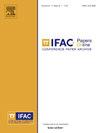From Dissensus to Consensus: Bias-Controlled Transition in Nonlinear Opinion Dynamics⁎
Q3 Engineering
引用次数: 0
Abstract
We propose a novel bias-based consensus framework for nonlinear opinion dynamics. Due to the observable and malleable nature of bias in human-robot interactions, we utilize it as a control parameter to achieve consensus. First, we analyze the Lyapunov–Schmidt reduced system near equilibrium under small bias assumptions. Through constrained cusp bifurcation, we show that increasing individual biases beyond identified thresholds—and relative biases beyond saddle-node limit points ensures consensus with a unique stable equilibrium. For large biases, we conduct a global phase-plane analysis. By establishing strong monotonicity and applying the Poincaré–Bendixson theorem, we eliminate the possibility of limit cycles and guarantee consensus with a unique stable attractor as equilibrium. Finally, along with numerical simulations for the two-agent, two-option case, we show that the proposed bias control approach extends seamlessly to decentralized multi-agent opinion consensus.
从异议到共识:非线性意见动力学中的偏见控制转变
我们提出了一种新的基于偏见的非线性意见动态共识框架。由于人机交互中偏差的可观察性和延展性,我们利用它作为控制参数来达成共识。首先,我们分析了在小偏置假设下Lyapunov-Schmidt约简系统的近平衡态。通过约束尖分岔,我们证明了增加个体偏差超过识别阈值,以及增加相对偏差超过鞍节点极限点,可以确保一致性与唯一的稳定平衡。对于较大的偏差,我们进行全局相平面分析。通过建立强单调性,应用poincar - bendixson定理,我们消除了极限环的可能性,并以一个唯一的稳定吸引子作为平衡点,保证了一致性。最后,通过对两智能体、两种选择情况的数值模拟,我们证明了所提出的偏差控制方法可以无缝地扩展到分散的多智能体意见共识。
本文章由计算机程序翻译,如有差异,请以英文原文为准。
求助全文
约1分钟内获得全文
求助全文
来源期刊

IFAC-PapersOnLine
Engineering-Control and Systems Engineering
CiteScore
1.70
自引率
0.00%
发文量
1122
期刊介绍:
All papers from IFAC meetings are published, in partnership with Elsevier, the IFAC Publisher, in theIFAC-PapersOnLine proceedings series hosted at the ScienceDirect web service. This series includes papers previously published in the IFAC website.The main features of the IFAC-PapersOnLine series are: -Online archive including papers from IFAC Symposia, Congresses, Conferences, and most Workshops. -All papers accepted at the meeting are published in PDF format - searchable and citable. -All papers published on the web site can be cited using the IFAC PapersOnLine ISSN and the individual paper DOI (Digital Object Identifier). The site is Open Access in nature - no charge is made to individuals for reading or downloading. Copyright of all papers belongs to IFAC and must be referenced if derivative journal papers are produced from the conference papers. All papers published in IFAC-PapersOnLine have undergone a peer review selection process according to the IFAC rules.
 求助内容:
求助内容: 应助结果提醒方式:
应助结果提醒方式:


